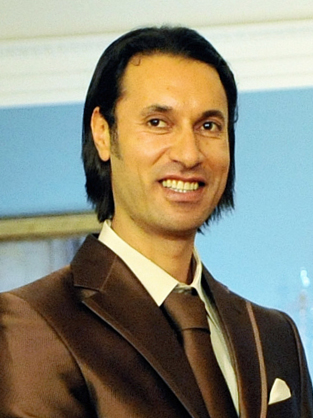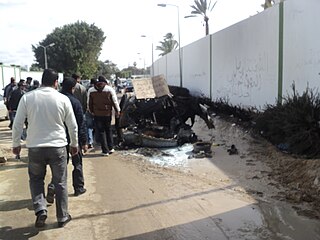| |||||
| Decades: | |||||
|---|---|---|---|---|---|
| See also: | Other events of 1972 List of years in Libya | ||||
The following lists events that happened in 1972 in Libya .
| |||||
| Decades: | |||||
|---|---|---|---|---|---|
| See also: | Other events of 1972 List of years in Libya | ||||
The following lists events that happened in 1972 in Libya .

The politics of Libya has been in an uncertain state since the collapse of the Libyan Arab Jamahiriya in 2011 and a recent civil war and various jihadists and tribal elements controlling parts of the country.

Muammar Muhammad Abu Minyar al-Gaddafi was a Libyan revolutionary, politician and political theorist who ruled Libya from 1969 until his assassination by rebel forces in 2011. He came to power through a military coup, first becoming Revolutionary Chairman of the Libyan Arab Republic from 1969 to 1977 and then the 'Brotherly Leader' of the Great Socialist People's Libyan Arab Jamahiriya from 1977 to 2011. Initially ideologically committed to Arab nationalism and Nasserism, Gaddafi later ruled according to his own Third International Theory.

On 5 April 1986, three people were killed and 229 injured when La Belle discothèque was bombed in the Friedenau locality of West Berlin. The entertainment venue was commonly frequented by United States soldiers; two of the dead and 79 of the injured were Americans.
Al-Saadi Muammar Gaddafi, also spelt as Al-Saadi Moammer Al-Gaddafi, is a Libyan retired professional football player. He captained the national team, but his career was widely attributed to the influence of his father Muammar Gaddafi, the country's leader at the time.
"Allahu Akbar" is an Egyptian pro-military patriotic song composed by songwriter Abdalla Shams El-Din in 1954 and written by poet Mahmoud El-Sherif in 1955. It was first used by the Egyptian Armed Forces as a marching song during the Suez Crisis in 1956. The song was also used as the national anthem of Libya under Muammar Gaddafi from 1969 to 2011.
Ayesha Gaddafi, also known as Aisha Gaddafi, is a Libyan former mediator and military official, former UN Goodwill Ambassador, and lawyer by profession.

Muammar Gaddafi became the de facto leader of Libya on 1 September 1969 after leading a group of young Libyan Army officers against King Idris I in a bloodless coup d'état. After the king had fled the country, the Revolutionary Command Council (RCC) headed by Gaddafi abolished the monarchy and the old constitution and established the Libyan Arab Republic, with the motto "freedom, socialism and unity". The name of Libya was changed several times during Gaddafi's tenure as leader. From 1969 to 1977, the name was the Libyan Arab Republic. In 1977, the name was changed to Socialist People's Libyan Arab Jamahiriya. Jamahiriya was a term coined by Gaddafi, usually translated as "state of the masses". The country was renamed again in 1986 as the Great Socialist People's Libyan Arab Jamahiriya, after the United States bombing that year.

Sirte, also spelled Sirt, Surt, Sert or Syrte, is a city in Libya. It is located south of the Gulf of Sirte, almost right in the middle between Tripoli and Benghazi. It is famously known for its battles, ethnic groups and loyalty to former Libyan ruler Muammar Gaddafi. Due to developments in the First Libyan Civil War, it was briefly the capital of Libya as Tripoli's successor after the Fall of Tripoli from 1 September to 20 October 2011. The settlement was established in the early 20th century by the Italians, at the site of a 19th-century fortress built by the Ottomans. It grew into a city after World War II.

Abdessalam Jalloud is a Libyan former politician and military officer who served as the Prime Minister of Libya from 16 July 1972 to 2 March 1977, under the government of Muammar Gaddafi. He was also Minister of Treasury from 1970 until 1972.

Mutassim Billah Gaddafi was a Libyan military officer, and the National Security Advisor of Libya from 2008 until 2011. He was the fourth son of former Libyan leader Muammar Gaddafi, and a member of his father's inner circle. His mother was Safia Farkash, who was said to be a Hungarian from Bosnia and Herzegovina.

Bab al-Azizia was a military barracks and compound situated in the southern suburbs of Tripoli, the capital of Libya. It served as the main base for the Libyan leader Muammar Gaddafi until its capture by anti-Gaddafi forces on 23 August 2011, during the Battle of Tripoli in the Libyan Civil War.
The Qadhadhfa is one of the Arab Ashraf tribes in Libya, living in the Sirte District in present-day northwestern Libya. They are traditionally counted amongst the country's Ashraf tribes, and during the Gaddafi regime were regarded as one of the greatest and most powerful tribes in the whole country. They are now mostly centered at Qasr Abu Hadi, Sirte.

United Nations Security Council Resolution 1970 was a measure adopted unanimously by the UN Security Council on 26 February 2011. It condemned the use of lethal force by the government of Muammar Gaddafi against protesters participating in the Libyan Civil War, and imposed a series of international sanctions in response.
Free speech in the media during the Libyan civil war describes the ability of domestic and international media to report news inside Libya free from interference and censorship during the civil war.
Mansour Dhao Ibrahim is a Libyan former politician. He was a prominent figure in the Gaddafi government, serving as Muammar Gaddafi's chief of security until they were both captured. Dhao was the leader of the regime's People's Guard. He is Gaddafi's cousin.

The killing of Muammar Gaddafi took place on 20 October 2011 after the Battle of Sirte. Muammar Gaddafi, the deposed leader of Libya, was captured by NTC forces and executed shortly afterwards.
The international reactions to the killing of Muammar Gaddafi concern the responses of foreign governments and supranational organisations to the killing of former Libyan leader Muammar Gaddafi at the Battle of Sirte, the last major engagement of the 2011 Libyan civil war, on 20 October 2011.
The following lists events that happened during 2007 in Libya.
The following lists events that happened in 1971 in Libya.
The following lists events that happened in 1975 in Libya.